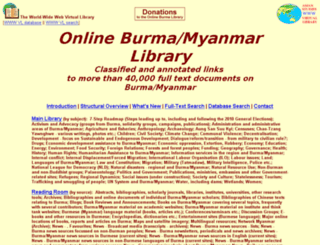Focal point
Location
The Online Burma/Myanmar Library (OBL) is a non-profit online research library mainly in English and Burmese serving academics, activists, diplomats, NGOs, CSOs, CBOs and other Burmese and international actors. It is also, of course, open to the general public. Though we provide lists of Burma/Myanmar news sources, the Library’s main content is not news but in-depth articles, reports, laws, videos and links to other websites, We provide a search engine (database and full text) and an alphabetical list of categories and sub-categories, but the Library is best accessed through browsing the 100 or so categories which lead to sub- and sub-sub categories. These tools should be used in combination.
Members:
Resources
Displaying 306 - 310 of 1151Landmine Monitor Report Myanmar/Burma, 2013 ( Burmese/ မြန်မာဘာသာ )
Includes Cluster Munition Monitor Report, 2013
Landmine Monitor Report Myanmar/Burma, 2013 (English)
Includes Cluster Munition Monitor Report, 2013
BURMA: Land grabbing not "in accordance with law"
Over the course of 2013 the Asian Human Rights Commission has followed reports of a larger number of conflicts over land grabs and attempted grabs in Burma, or Myanmar. Some of the conflicts are over recently taken land, and others are reinitiating struggles begun many years ago.
Myanmar Integrated Water Resources Management Strategic Study: Research and Analysis, Strategies and Measures
Introduction to IWRM in Myanmar: Setting the right strategy before master planning: "The Myanmar IWRM Strategic Study aims to contribute in a participative manner to the
development of a national strategy for integrated water resources management (IWRM) in
Myanmar1. The fullest possible use has been made of insights into delta management, IWRM
and adaptive water management as developed in the Dutch delta programme and elsewhere
in the world. The strategic study assists in responding to the national IWRM challenges and
The scramble for the Waste Lands: Tracking colonial legacies, counterinsurgency and international investment through the lens of land laws in Burma/Myanmar
This article traces the revenue category and legal concept of the Waste Land in Burma/Myanmar
from its original application by the British colonial apparatus in the nineteenth century, to its
later use in tandem with Burma Army counterinsurgent tactics starting in the 1960s, and finally
to the 2012 land laws and current issues in international investment. This adaptation of colonial
ideas about territorialization in the context of an ongoing civil war offers a new angle for under-


